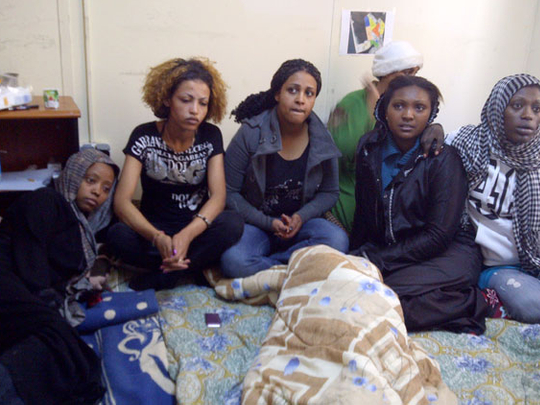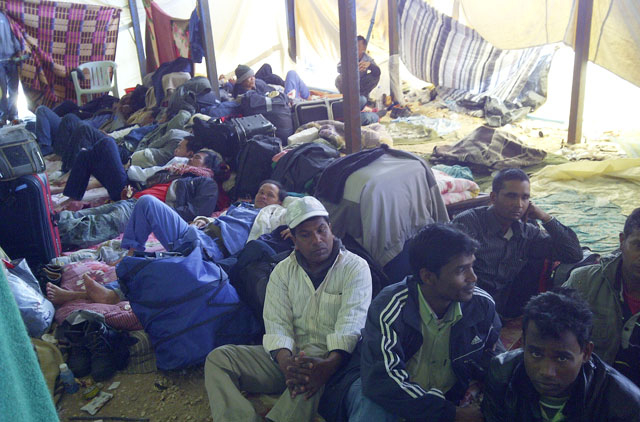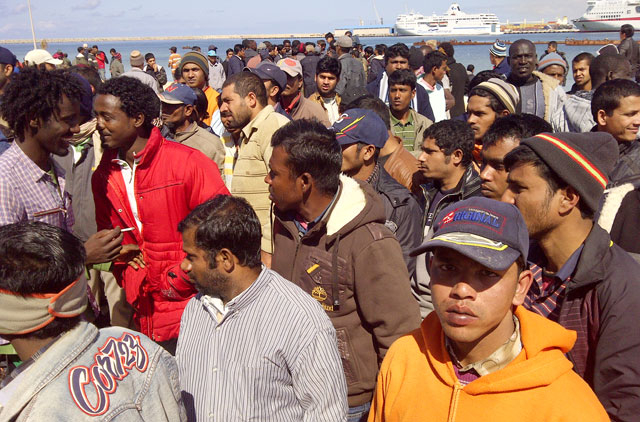
Benghazi: Approximately 9,000 refugees wait at Benghazi port to be evacuated to their respective countries, many of whom have been there for up to weeks with fear of disease spreading and no sign of assistance coming.
Foreign workers occupy cramped makeshift camps in tents and warehouses on eastern Libya's Benghazi port, where they wait as ship after ship comes to take its citizens.
Journalists entering the camp are given medical gloves and masks to avoid catching disease. Officials there assure Gulf News that no serious disease has broken out, but precautions need to be taken.
"The most we've seen so far is diarrhea and headaches, but there is no evidence of anything serious," said a student doctor on his volunteer shift at the camps.
Those lucky to have been sent assistance line up on the port in their hundreds with their belongings as they wait to board the ships.
On Monday, an Algerian ship was sent to pick up women and families, refusing single men and those without passports. Minor scuffles broke out when some men demanded to be boarded on the ship, saying they had traveled more than 1,000 kilometres from the volatile capital, Tripoli, and had nowhere to stay in Benghazi.
"In Tripoli, government officials confiscated our passports and told us to come here to Benghazi, where we would be evacuated, but the Libyan ship has refused to take us. How are we expected to go anywhere without our passports," said Esmail, an Algerian working for an oil company.
The ship, carrying 310 people and leaving behind many more, was expected to make the 40-hour journey to Algerian later on Monday.
Many others, however, were left stranded without any hope to leave the country.
Approximately 2,200 Bangladeshis, 1,200 Indians, 630 Africans and 520 Thai citizens, among others had also been waiting at the port for up to seven days, according to Wanees Ghadeer, a businessman in his early thirties who is in charge of the camps at the port.
Particularly dire was the situation of African citizens whose countries has no diplomatic representation in the country, and Bangladeshis who say their diplomatic missions have not heeded their pleas for assistance.
"Please help us. We really want to go home. Nobody is coming to help us," said an Eritrean woman, living in a 15m by 15m room with 10 other women.
A Bangladeshi worker said he had no idea where he was expected to go to look for assistance. "The Turkish company we work for in Benghazi has packed up and left and we had nowhere else to go so we came here," he said.
Many of those in the camps, including Vietnamese, Bangladeshis and Indians do not speak English or Arabic and have no way of communicating with officials, and have not yet found translators.
The responsibility of the entire camp has been taken up by a group of young, well-dressed, iPhone-carrying businessmen who have been providing every refugee with three meals a day.
Ghadeer said he had approached international organizations as well as humanitarian aid organizations but was yet to receive a reply.
"We only have seven more days' supply of food. If help doesn't come soon, some of these people may just die here," he said.














